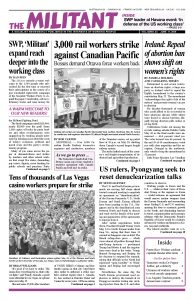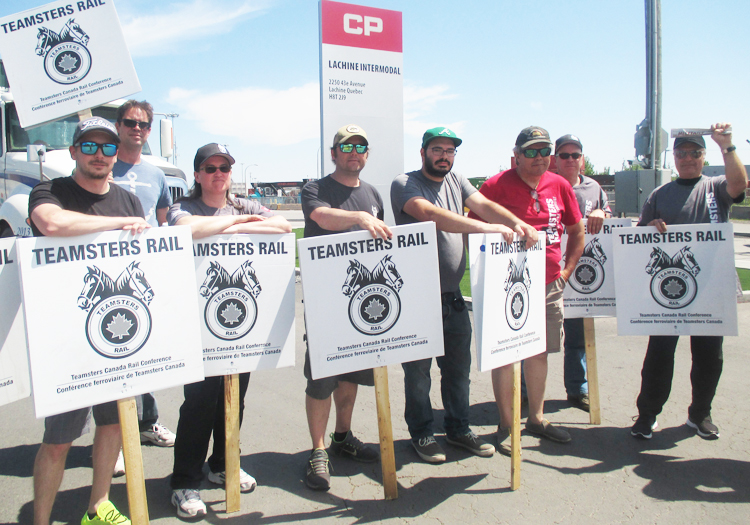MONTREAL — Over 3,000 Canadian Pacific Railway locomotive engineers and conductors, members of the Teamsters union, set up picket lines at 10 p.m. on May 29, shutting down Canada’s second largest freight railway system.
The strike halted much of the country’s rail freight transportation of industrial and agricultural production.
“We are striking for safety, dignity and respect in the workplace, against fatigue conditions and intense punitive discipline,” locomotive engineer Chris Yeandel told the Militant. Yeandel is vice-general chair of Locomotive East, Teamsters Canada Rail Conference.
 The rail workers overwhelmingly voted against the Canadian Pacific bosses’ “final contract offer,” during a May 14-23 electronic vote organized by Ottawa officials at the request of the company.
The rail workers overwhelmingly voted against the Canadian Pacific bosses’ “final contract offer,” during a May 14-23 electronic vote organized by Ottawa officials at the request of the company.
The workers charge that the bosses have refused to deal with the issue of tiring work schedules that compromise safety. The company forces workers to work exhausted, compounded by a reign of harassment, which has resulted in hundreds of disciplinary firings and 8,000 outstanding grievances.
Adding insult to injury, Canadian Pacific offered individual workers a bribe of $1,000 if they dropped their grievance.
At one picket line at the Port Coquitlam, British Columbia, rail yard a majority of the pickets raised their hands when asked by the picket captain how many had the experience of going to bed and being awakened by a phone call ordering them to report to work.
As a result of layoffs and speedup from Canadian Pacific’s productivity and profit drive over a number of years, 3,000 engineers and conductors currently do the work previously done by 4,300 workers. In 2017 CP’s profits rose sharply to 2.4 billion Canadian dollars, up from Can$900,000 in 2013.
Just before the strike began an additional 360 signal workers, members of the International Brotherhood of Electrical Workers, reached a three-year tentative agreement with Canadian Pacific preventing a shutdown of commuter rail service in Toronto, Vancouver and Montreal.
“Instead of negotiating, the company is relying on the government to resolve the dispute,” said Vancouver Teamsters Canada Rail Conference Local Chairman Jason Hnatiuk. Bosses that ship commodities and raw materials across North America using Canadian Pacific rail urged the government to intervene to try to force the striking workers back to work.
A two-day strike in February 2015, when pickets carried placards that read, “Fatigue kills,” ended under threat of federal strikebreaking legislation when union officials agreed to send the issues to arbitration. A 2012 strike also ended under threat of a back-to-work law.
Joe Young and Michel Dugré in Vancouver, British Columbia, contributed to this article.


